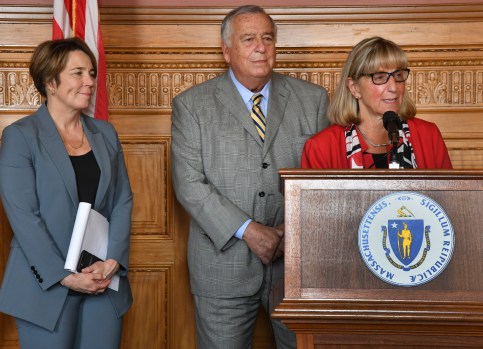On Thursday afternoon, the Massachusetts Senate voted 38 to 1 to adopt a compromise package for tax relief that was worth one billion dollars. The move comes after the House of Representatives approved the deal on Wednesday by a vote of 155 to 1. Because tax relief was conspicuously absent from the budget that was approved this summer, the passage of the compromise plan through both chambers of the legislature marks the conclusion of a protracted standoff on Beacon Hill regarding the issue of tax relief. The plan has been the target of criticism ever since it was first conceived of in the spring of this year. At that time, progressive organisations and legislators denounced the initial $742 million tax relief programme proposed by Democratic Governor Maura Healey as being excessively beneficial to rich citizens. One of these voices has come from organised labour, specifically the Massachusetts Teachers Association, which represents 115,000 workers and has 400 local chapters located all over the commonwealth. The President of the MTA, Max Page, was a guest on WAMC to discuss his opposition to the compromise plan.
PAGE: The Massachusetts Teachers Association invested a significant amount of both human and financial resources into the passage of the Fair Share Amendment. This amendment asks the very wealthiest people in the commonwealth to pay a little bit more in order to invest in the commonwealth’s public schools, colleges, and transportation systems. PAGE: The amendment was successful in passing. That was only a few months ago, in November, and only a month ago, we passed a budget that would actually start making those significant reinvestments. As a result, the recent decision by the legislature to return several hundreds of millions of dollars to some of the wealthiest individuals and largest corporations in the province comes as something of a surprise to us. Consequently, this is a really upsetting discovery. Working people will undoubtedly benefit from certain aspects of this tax plan, and we were successful in persuading the legislature to eliminate a loophole that would have allowed the affluent to get away with much more. But I would say that we are very, very disappointed that this is what a Democratic governor and Democratic legislature would do, which is to give back hundreds of millions of dollars when we just, not even a year ago, the voters voted to really ask the very wealthiest to pay a bit more so that we can have the investments in schools and transportation that we need. I would say that we are very, very disappointed that this is what a Democratic governor and Democratic legislature would do.
To begin, there is no evidence to suggest that the types of tax cuts that they just delivered, which were gifts to the really rich, truly benefit the so-called competitiveness of Massachusetts. They just offered those kinds of tax cuts. There is no evidence coming from other states that suggests that these tax cuts bring more businesses into a state or prevent enterprises or the wealthy from leaving a state. During the campaign that led to the passage of the Fair Share Amendment, we provided resounding evidence of this point, which eventually led to its success. Consequently, they should never have engaged in those giveaways in the first place. I would argue that some of the tax breaks that are being provided to working people are, of course, very beneficial. But what we truly need is not to give people, particularly people in the working class, a few hundred dollars more for childcare; rather, we should be establishing a fantastic public early education and childcare system instead. We ought to be investing, as we are promoting, high-quality public higher education that is free of student loan burden. It is completely unacceptable for these tax cuts to result in a loss of revenue, amounting to hundreds of millions of dollars year going forward, which will be diverted away from investments that are necessary.
Some of these objections to the tax package plan have been made public by the union for several months at this point. What do you think this indicates about the degree to which the legislature and the present administration are listening to groups like the MTA during the process of tax relief?
As I say, there are many organisations who support the decent tax cuts, and we did as well as the Raise Up Mass coalition, which supported some of the good tax cuts. I believe that there is a more effective method to establish access to cheap housing as well as access to childcare and early education, but I support those initiatives nonetheless. However, it is undeniably beneficial to provide money to individuals who are working. Therefore, the legislative body was aware of that. And they certainly did hear us in the face of vigorous campaigning from right-wing corporate groups. They did hear us on this loophole called the single filer loophole that would have allowed extremely rich individuals and families to get away with paying far less than their fair share in taxes. They did hear us on this loophole when we brought it up. As a result, in this sense, our campaigning was certainly successful in convincing the legislature to act in the appropriate manner. And one of the key components was a reduction in the tax rate applicable to gains on assets held for less than one year. That is a tax that is really levied against short-term traders and financial investors, which is a very small portion of the state that is very affluent. Therefore, rather than reducing it from 12% to 5% in one continuous step, they divided it evenly down the centre. Therefore, we’ll declare that a win because we got the least awful option.
What is your message to the people of the commonwealth regarding the current state of the legislature’s responsiveness to the needs of working people in the commonwealth at this point?
They did move forward, and ultimately, we were successful in our efforts to get the Fair Share Amendment passed. I will also mention that we are, in general, extremely happy with the state budget that was passed, particularly because they did a good job of separating the money from the Fair Share fund. Therefore, around half a billion dollars will be allocated to pre-K, 12th, and public higher education, while the remaining half billion dollars will be allocated to roads, bridges, and public transit. That’s great news because it means the money in question was won by our coalition and the general populace. It is therefore a good thing that they, the legislature and the governor, are spending it correctly and not replacing money that already exists with new funds, but rather adding things that we require. As a result, we are going to continue to put more effort into ensuring that the funds allotted for Fair Share are spent in ways that are truly beneficial to working people.





